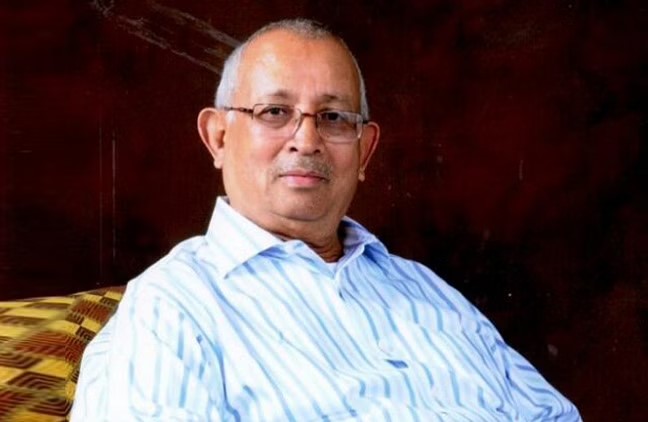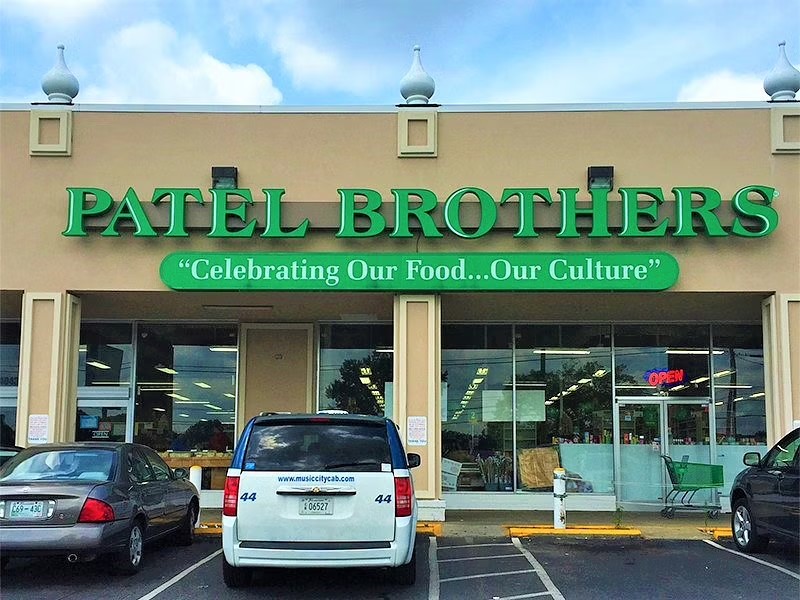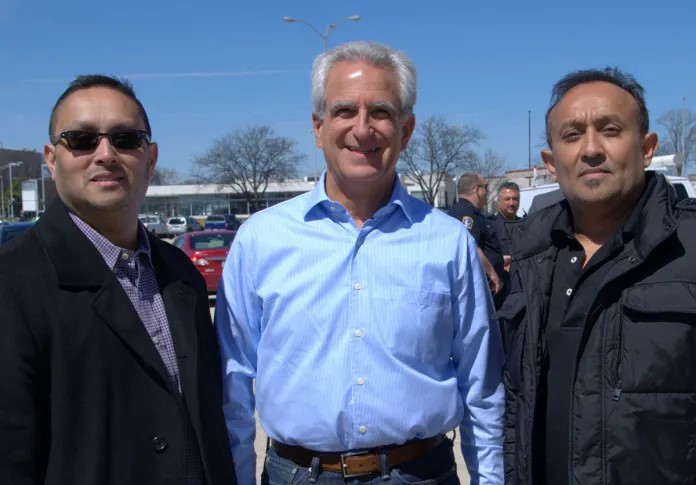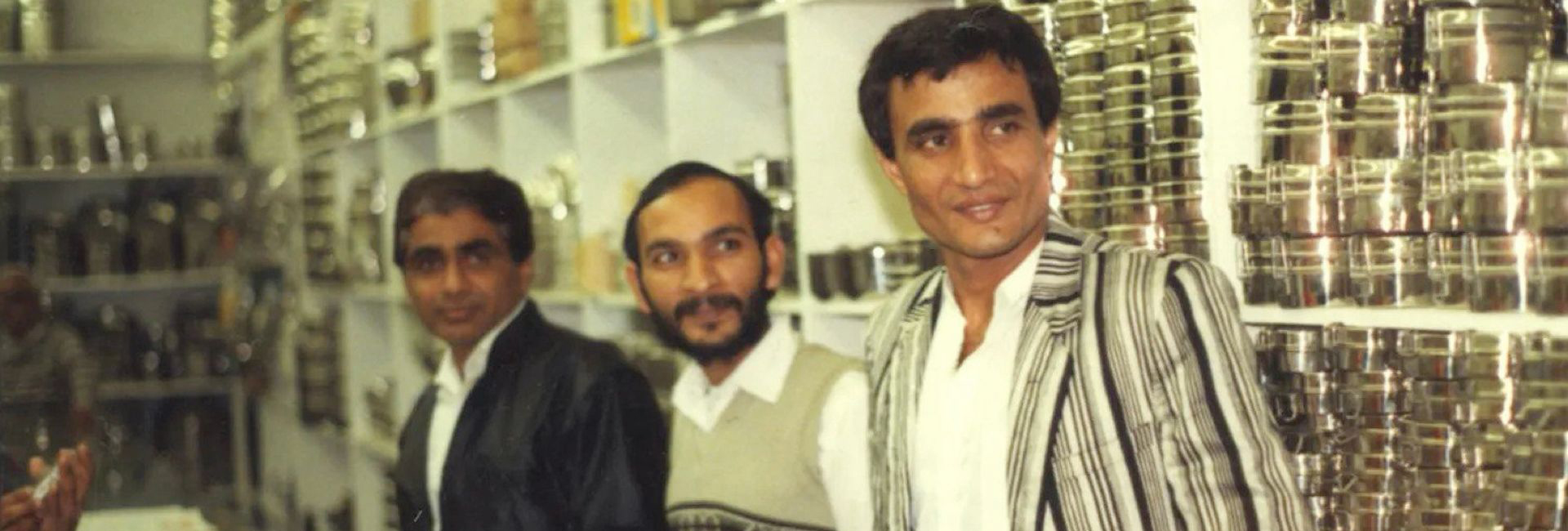(October 22, 2022) When Mafat Patel left home at the age of 23, back in the year 1968, his mother wept to see him go. Mafat had grown up sheltered, spending his childhood on a farm in a village named Bhandu, in Gujarat’s Mehsana district. The farthest from home he had ever been was the neighbouring district of Patan, where he earned himself a degree in Mechanical Engineering. When a friend, who had just returned from the US, asked Mafat’s father to consider sending his son, the old man jumped on the idea. As did Mafat. And so, in 1968, Mafat arrived in the United States of America, where he studied in Ohio. Global Indian takes a look at the story of Mafat Patel, his brother Tulsi and his sister-in-law Aruna and how they built the Patel Brothers grocery empire.
There was no inkling then, in the minds of his family, or even in the farthest reaches of Mafat’s own imagination, that he would go on to build an empire in America. Recently, as I chatted with a friend about the years she spent living in Hoboken, New Jersey, her mother demanded: “Did you tell her about the Patel Brothers supermarkets?” The chain of Indian grocery stores is an absolute go-to for every South Asian in New York, Chicago and Atlanta, a thriving business worth over $140 million. Mafat Patel, now in his seventies, still walks through the aisles, meeting his customers and addressing many by name as they sip on steaming chai or order hot chapatis.
After his business degree, Mafat moved to Chicago, where he had been offered a job in quality control at Jefferson Electric. “When I came here, there weren’t too many Indian families. We were two roommates from India, here together. Both of us were vegetarian and it was difficult to eat. We would cook on our own.” Although he had a good job and lived a comfortable life, Chicago just wasn’t home. The already overwhelming loneliness was only heightened by the fact that he didn’t have the one thing for which he wanted most – a hot, home-cooked Indian meal. “He would talk about how difficult it was, to come home in the cold and the rain on the bus and think, now what do we do about dinner,” said a friend of Mafat, Ramesh Vitha, in an interview.

Mafat Patel
The Devon storefront
In 1971, Mafat’s wife and children joined him in America. That year, he received an offer from a businessman named Ramesh Trivedi, who had a storefront on Devon Avenue that he was looking to sell. It was a dilapidated place but Mafat, whose business acumen kicked in instantly, leapt on the opportunity. He wanted to open an Indian grocery store. Mafat got in touch with his brother, Tulsi and his wife, Aruna, who left Gujarat and joined him in America.
In 1974, they got things up and running. “We started a small grocery store, in an 800 sq foot space,” Mafat said, in a 2018 episode of Zee TV’s Those Who Made It. “I was working and my brother was running the store. We did two shifts and Aruna was working from 10 am to 10 pm.” Mafat’s wife handled the domestic affairs and making sure the home ran smoothly. “If it wasn’t for Aruna, we wouldn’t be here right now. She was controlling the business then. We were two brothers and two sisters, all living together. We would stick together and worked very hard.” Mafat would arrive at the store after work, interviewing suppliers late into the night. Early the next morning, he would go back to the office.
Cultivating relationships
The Indian diaspora was miniscule, limited to around 150 families. “We opened the store and would go one or two days without a single customer,” Tulsi Patel said, in ‘Those Who Made It’. They held things together, though, with impeccable customer service. Tulsi would carry huge bags of groceries in cloth bags and deliver them to customers. “There were about 150 families and whenever they called, even if they were 10 miles away, we would go, in rain or snow. That’s how we maintained relationships,” said Mafat. Tulsi recalls, “Even if it was after 10 pm, I would make the trip, up to the third floor, just to deliver milk.”
They genuinely cared for their customers and that held them in good stead. Moreover, Mafat Patel was a far-sighted man – he predicted, correctly, that in 20 or 30 or even 40 years, there would be a lot more Indians in America and that they would need groceries.

As the business grew, Patel Bros needed external funding. That came from Ramesh Ajawani, a banker, whom the brothers still count among their closest friends. “He was still working as an engineer and trying to get a foothold in Indian groceries,” Ramesh said. “He said he had high energy levels, could work 24/7 and had a lot of passion for what he wanted to do. I liked his entrepreneurial attributes and we started doing a lot more.”
By 1976, Mafat recalls, they started expanding the business. “We bought another supermarket in Chicago. In 1977, we built other stores on Devon Avenue. In 1981, we went to Atlanta and a year later, to New York. Then the whole family came and we had lots of hands.” Mafat stayed with his day job for 16 years, finally quitting in 1985 to devote himself full time to the import/export business. Patel Bros had arrived, bringing Indian grocery stores into the mainstream, to compete with mega stores like Walmart.
The next generation
Today, the reins are held largely by Mafat’s son Swetal and his nephew, Rakesh. Swetal Patel was born to Mafat Patel and his wife in Chicago, growing up in a family of 10. Although business was thriving, life wasn’t always easy for Swetal, Indians were still decidedly a minority in the US. Like most immigrants growing up in a foreign country, he struggled to balance two identities – the America he saw every day at school and the close-knit, Gujarati joint family to which he returned every day. He didn’t want to carry Indian food for lunch every day, because of how it smelled, according to Intertwined Cultures.
Every day after school, all the Patel children would help out with the family business. As his American peers went home to a PBJ and chocolate milk, Swetal Patel helped his parents make bhel puri. Evenings and weekends were spent bagging groceries, talking to customers, sweeping floors and loading and unloading goods. He recalls helping customers wheel their grocery carts in winter, winding his way through the snow. Back home, his mother continued to hold the fort, keeping meals ready for the ever-growing family and for the stream of guests and visiting relatives.

Swetal and Rakesh Patel
Today, Patel Bros is every bit the organised supermarket. Back when Swetal lent a hand, though, the place was chaos. Even that lack of organisation held a sense of Indian-ness, the smell of spices pervading through the cloth bags, all stacked along the shelves as customers stood around and pointed to what they wanted. Every morning at 10 am, the store would open with an hour of ‘bhajans’.
Branching out
They have thriving stores in 51 locations across America and the Patel Brothers haven’t stopped there. They also own Patel Air Tours, Sahil, a clothing boutique for Indian weddings, Patel Handicrafts and Patel Cafe. In 1991, they also launched Raja Foods, a Patel Brothers subsidiary, which offers readymade foods like chapatis and samosas.
Much of their success, they will readily admit, comes from remaining connected to Indian family values. A large section of their employees still comprises members of the family. “I have brought more than 350 families here and they are all well-to-do,” Mafat said, in the Those Who Made It episode. The families come there, learn the trade and in time, Mafat will help them set up their own store.
“Whatever you get in India, you will get in Patel Brothers,” Mafat smiles. “People from everywhere come to Devon Avenue or New York and say, ‘let’s go see the Patel Brothers’. Asian immigrants know their needs will be met in a single store. We are essentially grocers. From ingredients like turmeric and red chilli powder, to snacks like khakras, gathias and theplas, we are a truly Indian brand and cater to almost all NRIs in the US.”




Job
Who Stopped you going back to India?